Nature restoration: Parliament adopts law to restore 20% of EU’s land and sea
- EU countries must restore at least 30% of habitats in poor condition by 2030, 60% by 2040, and 90% by 2050
- Provisions for agricultural ecosystems can be temporarily suspended under exceptional circumstances
- Over 80% of European habitats are in poor shape

Photo caption: Parliament has adopted the first EU law to restore degraded ecosystems across the EU © Arnau / Adobe Stock
The new law sets a target for the EU to restore at least 20% of the EU’s land and sea areas by 2030 and all ecosystems in need of restoration by 2050.
The EU nature restoration law, agreed with member states, will restore degraded ecosystems in all member states, help achieve the EU’s climate and biodiversity objectives and enhance food security.
To reach the overall EU targets, member states must restore at least 30% of habitats covered by the new law (from forests, grasslands and wetlands to rivers, lakes and coral beds) from a poor to a good condition by 2030, increasing to 60% by 2040, and 90% by 2050. In line with Parliament’s position, EU countries should give priority to Natura 2000 areas until 2030. Once in a good condition, EU countries shall ensure an area does not significantly deteriorate. Member states will also have to adopt national restoration plans detailing how they intend to achieve these targets.
Agriculture ecosystems
To improve biodiversity in agricultural ecosystems, EU countries will have to make progress in two of the following three indicators: the grassland butterfly index; the share of agricultural land with high-diversity landscape features; the stock of organic carbon in cropland mineral soil. Measures to increase the common farmland bird index must also be taken as birds are good indicators of the overall state of biodiversity.
As restoring drained peatlands is one of the most cost-effective ways to reduce emissions in the agricultural sector, EU countries must restore at least 30% of drained peatlands by 2030 (at least a quarter shall be rewetted), 40% by 2040 and 50% by 2050 (where at least one-third shall be rewetted). Rewetting will remain voluntary for farmers and private landowners.
The law provides for an emergency brake, as requested by Parliament, so targets for agricultural ecosystems can be suspended under exceptional circumstances if they severely reduce the land needed for sufficient food production for EU consumption.
Other ecosystems
The law also demands a positive trend in several indicators in forest ecosystems and an additional three billion trees to be planted. Member states will also have to restore at least 25 000 km of rivers into free-flowing rivers and ensure there is no net loss in the total national area of urban green space and of urban tree canopy cover.
Quote
After the vote, rapporteur César Luena (S&D, ES), said: “Today is an important day for Europe, as we move from protecting and conserving nature to restoring it. The new law will also help us to fulfil many of our international environmental commitments. The regulation will restore degraded ecosystems while respecting the agricultural sector by giving flexibility to member states. I would like to thank scientists for providing the scientific evidence and fighting climate denial and young people for reminding us that there is no planet B, nor plan B.”
Next steps
The deal agreed with member states was adopted with 329 votes in favour, 275 against and 24 abstentions.
It now also has to be adopted by Council, before being published in the EU Official Journal and entering into force 20 days later.
Background
Over 80% of European habitats are in poor shape. The Commission proposed on 22 June 2022 a nature restoration law to contribute to the long-term recovery of damaged nature across the EU’s land and sea areas, to achieve EU climate and biodiversity objectives and to reach the EU’s international commitments, in particular the UN Kunming-Montreal Global Biodiversity framework. According to the Commission, the new law would bring significant economic benefits, as every euro invested would result in at least 8 euro in benefits.
This legislation is responding to citizens' expectations concerning the protection and restoration of biodiversity, the landscape and oceans as expressed in proposals 2(1), 2(3), 2(4) and 2(5) of the conclusions of the Conference on the Future of Europe.
Oil spill spreads across Caribbean from Tobago to Bonaire
 IMAGE SOURCE,
IMAGE SOURCE,
REUTERS
Image caption,
The barge capsized off the shore of Tobago
By Vanessa Buschschlüter
BBC News
Oil leaking from a capsized barge off the coast of Tobago has spread hundreds of miles to reach the Caribbean island of Bonaire.
Officials on Bonaire, which is located 50 miles (80km) north of the Venezuelan coast, said the oil posed a "serious threat to both humans and nature".
The island is the latest to have been contaminated with oil from the barge which ran aground earlier this month.
It is still unclear who owns the barge and what may have caused it to sink.
The authorities on Bonaire, which is a special municipality of the Netherlands, said the island's east coast, including Sorobon, Lac and Lagun, had been polluted.
They also warned that the island's mangrove, fish and coral ecosystems were at risk.
The oil leak was first spotted by the Trinidad and Tobago Coast Guard on 7 February. They traced it to a barge which had become lodged on a reef about 150m (500 ft) off Tobago's southern coast.
There was no crew on board the barge and the Coast Guard said it had not received any distress signals. They did, however, spot the name "Gulfstream" painted on the side of the vessel.
Trinidad and Tobago authorities said the barge had originated in Panama and had been towed by a tugboat. They said it appeared "to have been bound for Guyana".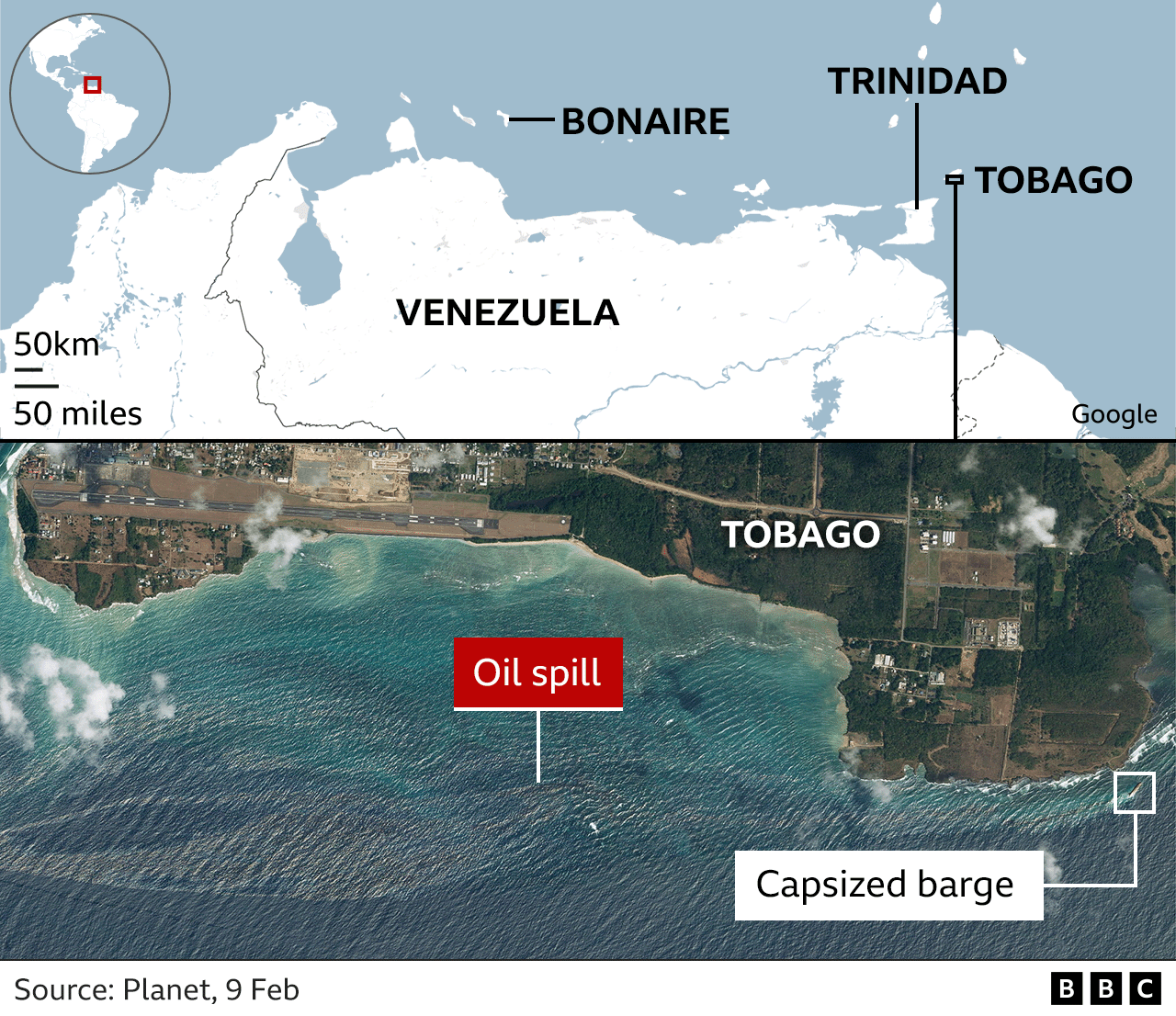 An investigation conducted by online investigative journalism site Bellingcat suggests the barge stopped in late January in Pozuelos Bay, a Venezuelan port used by the state-owned PdVSA oil company.
An investigation conducted by online investigative journalism site Bellingcat suggests the barge stopped in late January in Pozuelos Bay, a Venezuelan port used by the state-owned PdVSA oil company.
According to Bellingcat, the barge may have started leaking oil as early as 3 February. The whereabouts of the boat which had tugged the barge are not currently known.
The prime minister of Trinidad and Tobago declared a national emergency on 11 February. The country's Office of Disaster Preparedness and Management has been trying to contain the spillage but oil has been continuing to leak from the barge.
The Trinidad and Tobago Weather Center said satellite images suggested the oil slick had spread into the marine area of Grenada as early as 14 February.
From there, it appears to have been carried further westward to Bonaire.
Officials on Bonaire are particularly concerned for the mangroves, which are among the best preserved in the Caribbean.
Escaping Sudan: 'My mother’s body was left by smugglers in the desert'
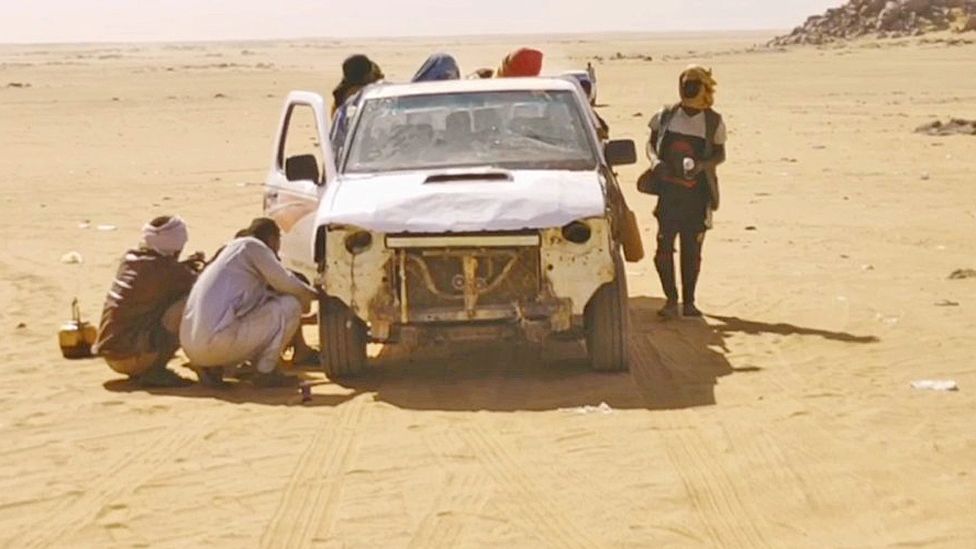 By Mohamed Osman
By Mohamed Osman
BBC News Arabic, Cairo
Desperate to escape Sudan's war, people have told the BBC how they have handed over their precious savings to unscrupulous people smugglers-cum-gold miners, to make a terrifying journey to Egypt - a trend that continues as the brutal conflict enters its 10th month.
"They left me and my dead mother in the desert," 25-year-old Salama, who made her first desperate attempt to cross the border with her family in August, told the BBC.
Like all those interviewed for this article, her name has been changed for her safety.
She was travelling with her 65-year-old mother and four other relatives in the back of the smuggler's pick-up truck when it crashed, throwing her mother out of the vehicle.
They had been travelling for eight hours and stopped to sleep overnight before the accident happened.
"We kept trying to tell the driver to slow down," Salama said.
But the advice went unheeded and her mother died after hitting her head.
The smugglers refused to transport her dead body so bundled Salama, who was crying uncontrollably, along with the rest of the family and their belongings off the truck - and to their horror drove away without them.
Salama had made the decision to leave her home in Omdurman - a city just across the River Nile from the capital, Khartoum - as the fighting was creeping ever closer.
She moved her family to the northern town of Gabgaba from where smugglers operate. It has been nicknamed "Gabgaba Airport" by locals because of the influx of those seeking an escape.
The conflict - a vicious power struggle between the military and a paramilitary group, the Rapid Suport Forces (RSF) - erupted last April.
It has forced more than 10 million people from their homes, with an estimated 450,000 fleeing to Egypt.
Salama, who is a widow with two children, said they could often hear gunfire in their neighbourhood.
"We had to leave. Our lives were in danger," she said.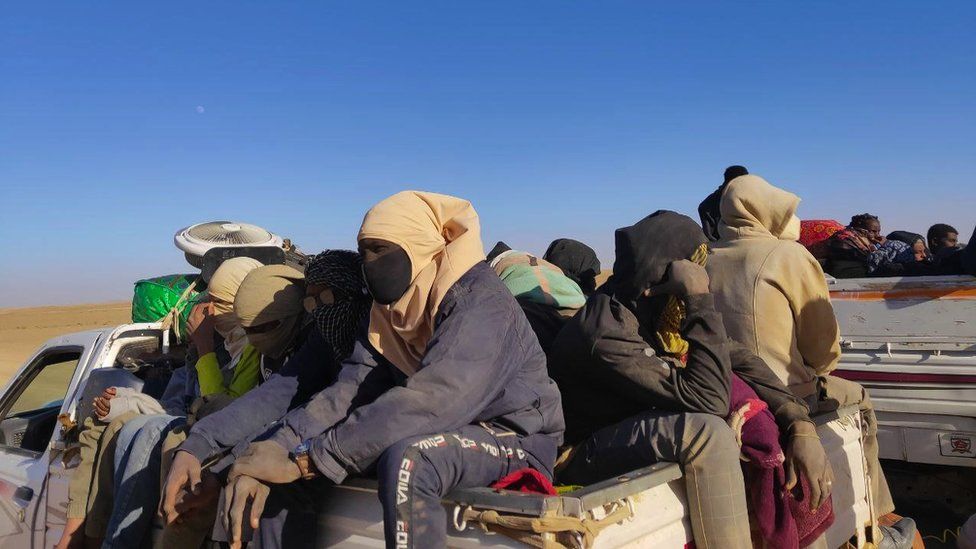 Image caption,
Image caption,
Those organising the smuggling are often gold miners in the area with access to pick-up trucks
Before she had set off with her mother, she had already organised for her children to escape across the border with other relatives using the desert-smuggling route as it had become "impossible" to get a visa to travel legally to Egypt.
Women and children used to be able to enter Egypt without a visa but with the war came new restrictions.
The smugglers are usually men who are involved in gold mining in the area, so know the tough desert terrain along the 1,200km (745-mile) border and have access to trucks.
They charged her $300 (£235) per person for the crossing - money that she did not get back when she was abandoned in the desert.
Eventually, after hours of waiting by the side of the road with her mother's body and with little food and water, Salama managed to flag down a driver, who was travelling into Sudan with food and electrical goods.
He took the family to the northern Sudanese city of Abu Hamad, where they managed to bury Salama's mother.
Salama's experience is not unusual - though people are reluctant to open up about their experiences.
However, those who agreed to talk to the BBC said accidents were common as the smugglers drive at high speeds to evade the authorities.
Ibrahim, a government employee from Khartoum, who did made it to Egypt last August, told the BBC a man he was travelling with broke his neck and died after the truck they were in hit a rock.
The smugglers insisted on leaving his body and burying it in the desert.
"Everyone was horrified. I stared at the unmarked grave as we drove away, while the women and children in the truck wept," Ibrahim said.
Robberies are also common. Halima told the BBC about a frightening experience in December before their truck reached the border.
"We were attacked by four masked gunmen when our truck broke down. They fired gunshots in the air, slapped my daughter and stole our belongings," said the 60-year-old who had fled Gezira state after RSF fighters attacked her home.
The attackers were scared off when another car came along and luckily that driver agreed to help them and took them over the border.
Halima said her 25-year-old daughter, a psychologist, was badly shaken by the incident - and died the day after their arrival in Egypt.
"She had a panic attack and couldn't breathe," she said, explaining that they could not get her medical aid in time.
The BBC has seen a copy of the death certificate, which cites respiratory problems as the cause of death.
People the BBC spoke to said the activity of the smugglers has increased with prices going up by 200% since the RSF carried out attacks at the end of last year in Gezira, a state which had been a safe haven for those escaping the fighting in Khartoum.
Most of the smugglers insist on payment via a banking app. Some people scrabble together their scant savings to make the payment or get the money from their relatives in the diaspora.
The BBC has contacted the Egyptian government to ask what it is doing to tackle the smugglers but has not received a response.
Sudan's consulate in Aswan in southern Egypt said it had launched a campaign to warn of the dangers associated with people smuggling.
"We are working with the Egyptian government to help speed up the visa process, to help increase the number of approved applications and allow more Sudanese people into the country legally," a Sudanese official in Aswan, Abdel Qader Abdullah, told the BBC.
People in Sudan can apply for an Egyptian visa in two places - Wadi Halfa in the north and Port Sudan in the east. Most head to Wadi Halfa as it is nearer to Argeen, the main land border crossing.
But there is almost no infrastructure in Wadi Halfa and people wait in queues for hours to be processed.
After applying, it can take months to find out if they are successful. Displaced and with little money, they wait and sleep anywhere they can - in nearby schools or on the streets.
After her failed attempt, Salama decided it might be easier to head to Port Sudan to try a legal route.
But after waiting for two months, she had no response from the Egyptian consulate about her visa request so she opted to try the smugglers again, heading to the northern city of Atbara in October.
"This time we prepared for the journey," she said, explaining how they packed more provisions.
"We spent around six days in the desert," she said, before successfully getting across the border into southern Egypt.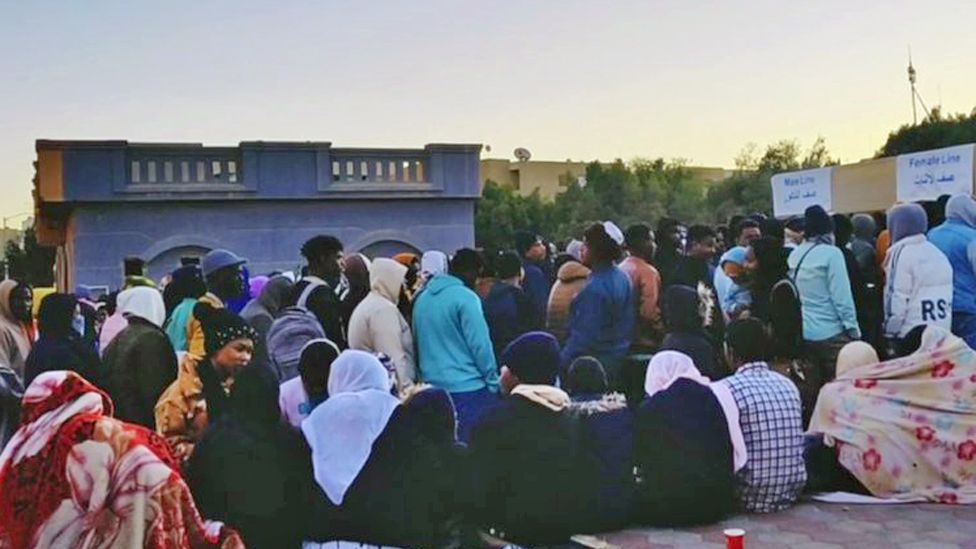 Image caption,
Image caption,
Sudanese migrants queue for hours in Cairo to get a UN appointment for refugee status
But once in Egypt, the plight of Sudanese migrants is not over. If they do not have refugee status or cannot prove they have an appointment to apply for it, they can be deported.
To make an appointment they have to travel to either Cairo or Alexandria.
At the UN High Commissioner for Refugees (UNHCR) centre in Cairo, thousands stand in long queues waiting to register their names and obtain what is known as a yellow card.
"You stand in the cold weather for hours, only to schedule a meeting for four months later," Halima said.
"Obtaining a yellow card, which you get once you're a registered UN refugee, allows you to legally get work and receive monthly funds from the UN," she said, adding that she has been told to return in April to find out if she could get one.
But Ibtessam, who has managed to get refugee status, told the BBC that since her arrival in June she had received no funds from the UN.
"My husband is dead. I have rent and school fees to pay every month, and no-one is helping us."
UNHCR's Christine Beshay acknowledged such frustrations but said the organisation was "facing a shortage of funds".
"We have expanded our capacity by 900%. So we have to prioritise and think: 'Who needs help first?'" the spokesperson said, adding: "We have set up medical services at the border with help from the Egyptian Red Crescent."
Salama has been reunited with her children in Cairo, living in a small apartment with other relatives.
She has received her refugee status and would ideally like to move into her own home but this is impossible with little help or money.
The young woman tells me she worries about the future all the time - and ideally would like to return home.
She is grateful to have found safety but remains angry and traumatised that she was forced to pay smugglers that cost her her mother's life.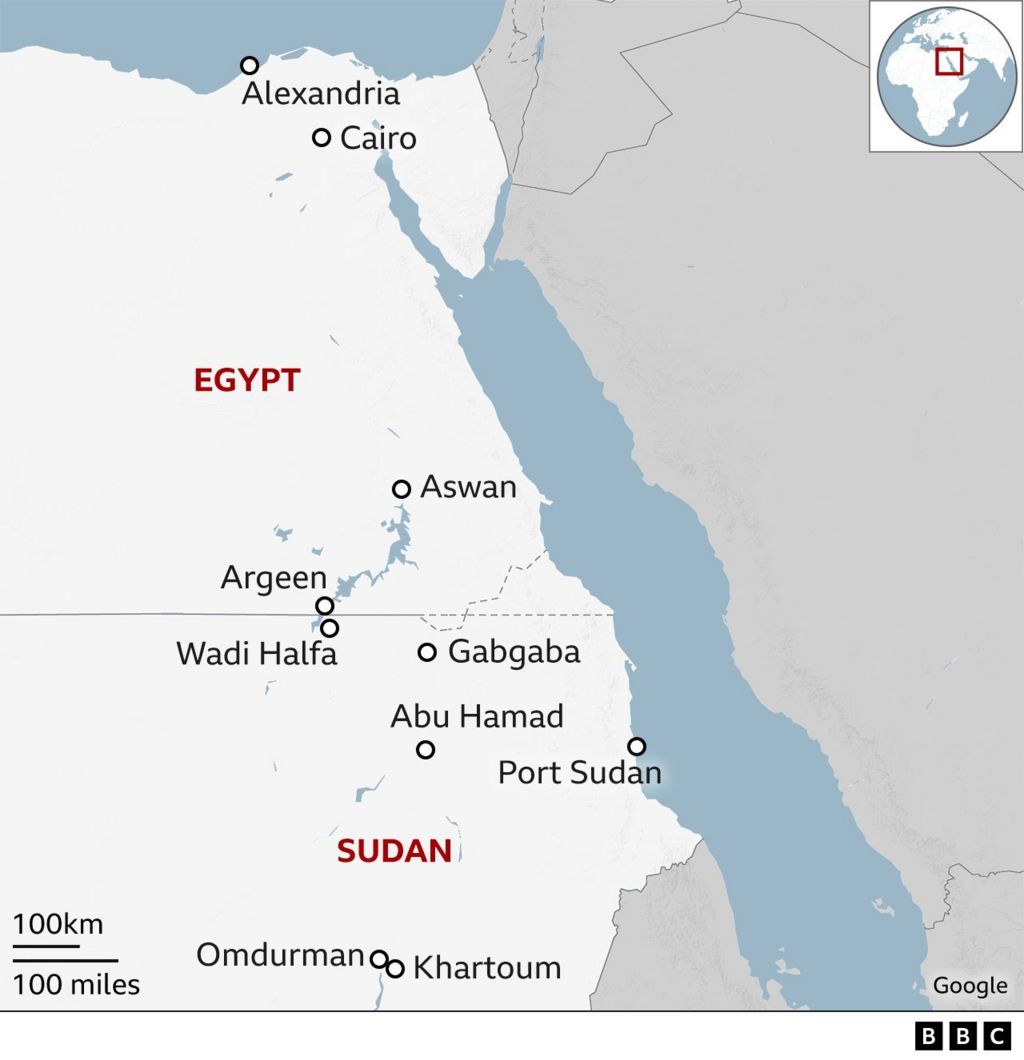

More on the conflict in Sudan:
- What is going on in Sudan? A simple guide
- BBC reporter: My heartbreaking decision to leave Sudan
- Shoes to TVs - looting spree ravages war-hit Sudan
- Why an accountant has taken up arms in Sudan
- 'I saw bodies dumped in Sudan mass grave'
Sandra Hüller on Anatomy of a Fall: This year's Oscars dark
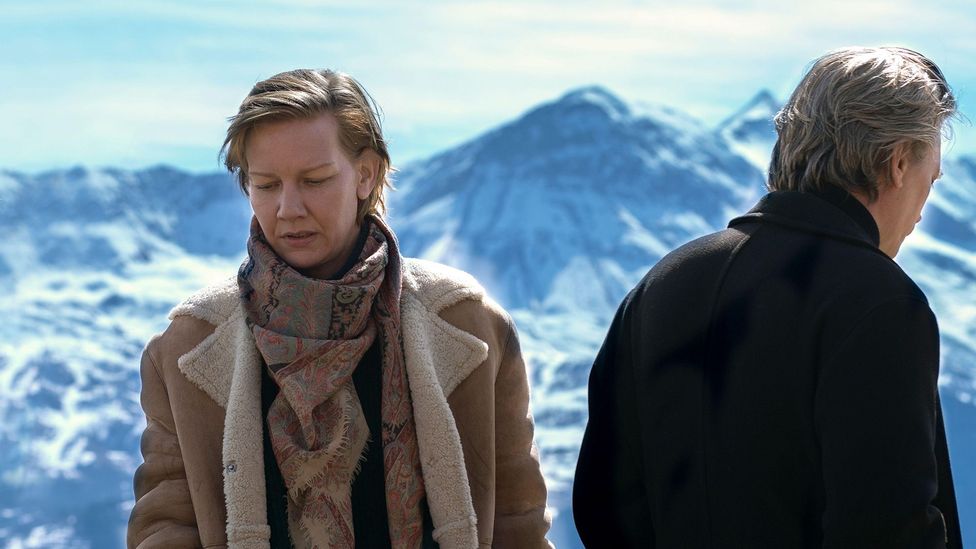 By Emma Jones
By Emma Jones
The German actress Sandra Hüller has an Oscar nomination for her blistering performance in Anatomy of a Fall. The film's viral moment could make her a contender for the top prize.
I
In two of this year's most acclaimed – and Oscar-nominated – films, German actress Sandra Hüller plays two characters who in different ways are perceived as monsters. In the case of Hedwig, the wife of the Auschwitz commandant Rudolf Höss, growing a garden and ignoring the death camp over the fence in Jonathan Glazer's The Zone of Interest – this perception is more readily understood. But what about when the monstrous mantle is given to the confident, outspoken, bisexual writer Sandra, when she is accused of murdering her husband in French director Justine Triet's Anatomy of a Fall?
More like this:
- Anatomy of a Fall's Messi: The dog who deserves an Oscar
- How the horrifying sounds in The Zone of Interest were created
- Why foreign language films are going mainstream
Last month Hüller received a best actress Oscar nomination for this role, one of five in total for the film, which also took the Palme d'Or at the Cannes Film Festival. The Zone of Interest also received five Oscar nominations, putting the critical spotlight back on Hüller, eight years after she first received international acclaim for playing another woman seemingly indifferent to anyone's opinion – Ines, in Maren Ade's father-daughter drama comedy Toni Erdmann.
How does Hüller feel about her fictitious namesake Sandra being accused of being a monster? In the film's lengthy courtroom scenes, the prosecution aggressively cross-examines her, using her own writing and marital infidelities as evidence to support its case. Sandra herself protests during the film, "I'm not a monster!". Society's judgement that, if guilty, she must be, seems already present.
Sandra's just actually acting like a man and if that were the case no one would say anything about it – Sandra Hüller
"I find that so interesting," she tells BBC Culture, from backstage at the International film festival in Rotterdam, where she gave a career talk.
"Even just today, a close friend of mine told me that 'yes, Sandra's just actually acting like a man and if that were the case no one would say anything about it'. But the fact that she's a woman and behaving that way seems to be scary for some people."
Anatomy of a scene
The Sandra of Anatomy of a Fall is blunt, career-focused and doesn't hide the fact she is more successful as a writer than her husband Samuel (played in the movie by Samuel Theis), who she's accused of pushing to his death at their French chalet house. She's also bisexual, and Hüller thinks all these characteristics add to the debate around her.
"Unfortunately, it's rare to find female characters that have so much to tell and that are so true to themselves and that are so intelligent and so carefully written and that don't have any clichés in them. It was really liberating to play a woman who knows a lot about herself. I think Sandra's really done the work and I admire that very much."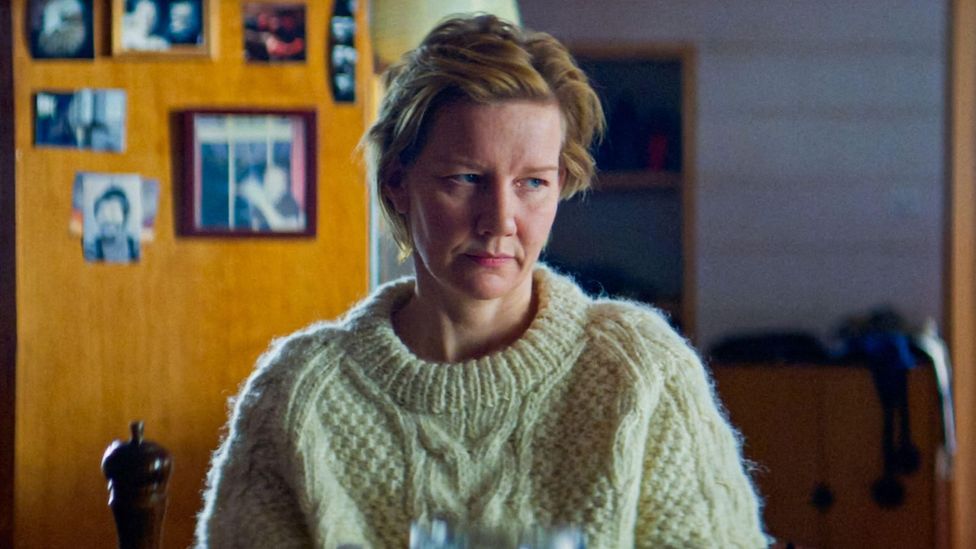 Anatomy contains a blazing marital argument that went viral earlier this year (Credit: Alamy)
Anatomy contains a blazing marital argument that went viral earlier this year (Credit: Alamy)
The fictitious Sandra is neither a femme fatale nor frightened victim in the electrifying noir thriller-meets-courtroom drama written by Triet and her partner, Arthur Harari, who has co-written most of the films she's directed. Anatomy contains surely one of the most blazing and memorable marital arguments ever seen in cinema. One particular scene went viral earlier this year, and currently has just under 10 million views on TikTok. When the film first premiered at Cannes, Justine Triet told the BBC that she had wanted to explore the tensions of a long-term relationship.
"I think it's very complicated to live together," she said at the time. "What do we owe each other, what do we give each other, what is love and how can we live together? It seems very simple, but in fact it is a question."
Hüller agrees that the scene is "extraordinary" but thinks that's down to the strength of Triet and Harari's own relationship.
"It's not because of us, it's because of the writing. It helps that the people who wrote it are living together, and they wrote down their worst nightmare, how it could go really, really wrong," she points out.
"They went into a place that was really uncomfortable, I think. And I can only thank them for that because it was brave. I'm often talking about bravery in filmmaking, but I do think it was really brave to write this as a couple; I've lots of respect for that."
An international success story
Anatomy of a Fall is an examination of the breakdown of a relationship through the lens of the courtroom, set against the formality of the French legal system, already portrayed in 2022 by Alice Diop in the film Saint Omer as inherently prejudiced towards women accused of emotive crimes.
In the witness box, Sandra is interrogated about her dedication as a wife and also as a mother to the couple's young son Daniel (played by Milo Machado-Graner) who happens to be blind and also the main witness. Her marital infidelities with both men and women are exposed to the court.
Does Sandra's bisexuality count against her in the courtroom, as some have debated? "It's interesting that fact is frightening for some people," Hüller replies. "Or that even makes her, I don't know, less believable? I mean, let's not even go there, it's just ridiculous."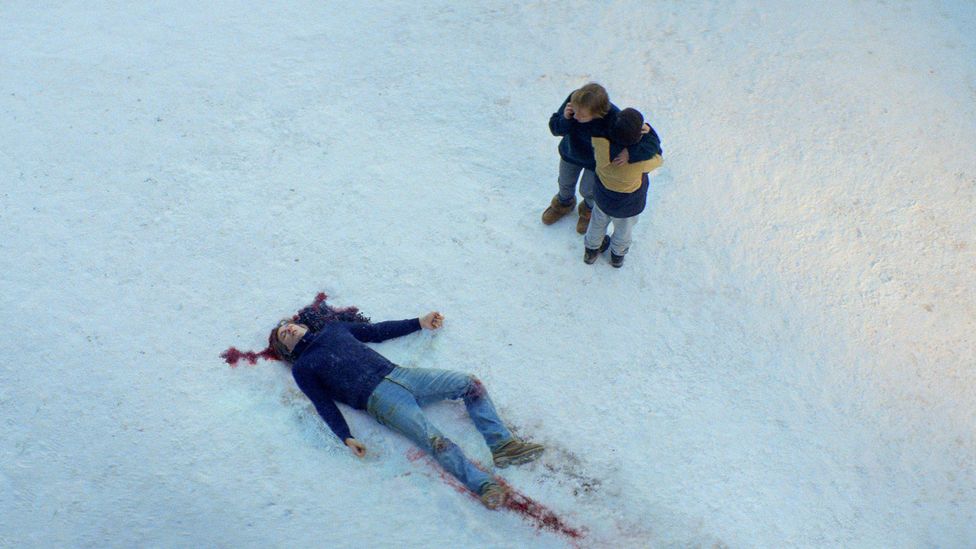 Sandra is more successful than her husband Samuel (Samuel Theis) – she's accused of pushing to his death at their French chalet house (Credit: Alamy)
Sandra is more successful than her husband Samuel (Samuel Theis) – she's accused of pushing to his death at their French chalet house (Credit: Alamy)
Hüller has so far spent much of her career working in theatre, which perhaps stood her in good stead for Anatomy's long scenes, which were spoken in English and French, her second and third languages. It's something the actress says she loved and wants to do more of. "There's a lack of control in other languages that I enjoy very much because I can never do it right. There will always be an accent and little mistakes, and I really like that fact that I can focus so much more on what I say than how I say it," she explains.
Triet and Hüller described themselves at Cannes as "sisters from another mister" as they've also worked together on the 2019 comedy drama Sibyl, about a psychotherapist-turned-writer who finds her latest patient is a tempting source of inspiration for her work. While Triet's earlier works, like Sibyl or 2016's In Bed with Victoria, have a comic undertone that Anatomy doesn't have, all these heroines share a strong ownership of their sexuality.
The film's success – it's made more than $28m internationally – has propelled Triet into a different league: she's now a Palme d'Or winner and one of only eight women filmmakers to be nominated for a best director Oscar.
"I don't understand why it took so long," says Hüller of Triet's recognition. "I really don't get it because even when I saw her first short film, I thought, 'this is really something'. I think it's remarkable what she's doing, the way she's thinking, the risks she's taking. I really admire her very much."
The film's big unanswered question
The director also took a risk in fiercely criticising French film industry policy (about the suppression of pension protests) during her Palme d'Or acceptance speech, which resulted in her being called "ungrateful" by the French culture minister. It may also have been one of the reasons Anatomy of a Fall was passed over as the French Oscar entry for best international film – although if so, Triet may have had the last laugh.
As long as we recreate those narratives…almost that just one woman is allowed in there, it's going to stay that way – Sandra Hüller
Now the filmmaker finds herself the only woman in a directing category that also includes The Zone of Interest's Jonathan Glazer. Only once before, in 2021, have two women ever made it to that shortlist, and the exclusion of Greta Gerwig, who made the billion-dollar box office saviour Barbie, provoked well-publicised indignation, especially from Gerwig's leading man, Ryan Gosling.
"I still think it's a strange picture to see Justine in the middle of four men. I find it strange. And I would have loved to have seen Greta Gerwig nominated. Of course, I would," says Hüller. "I think though as long as we recreate those narratives about maybe it's just the way it is, almost that just one woman is allowed in there, it's going to stay that way."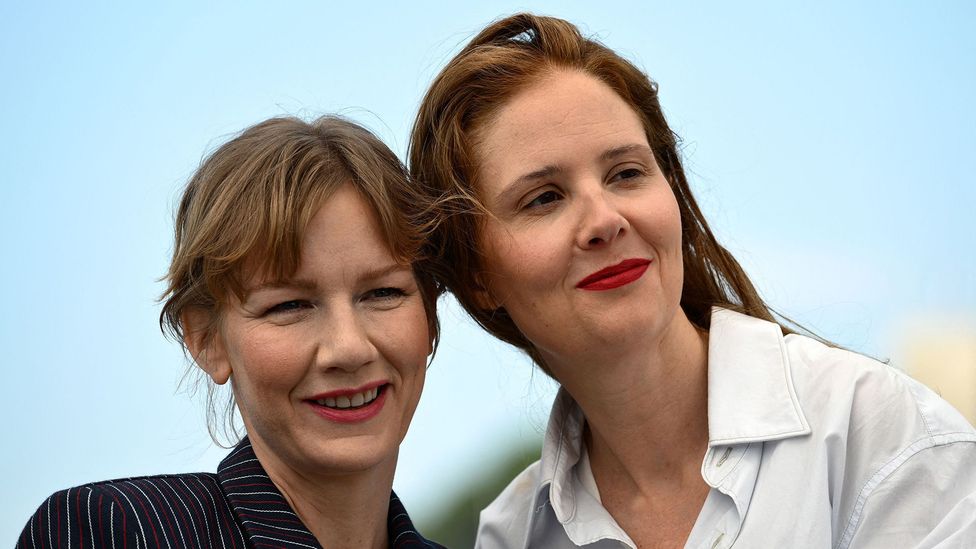 Justine Triet (pictured with Hüller) is the only woman nominated in the Oscars' best director category (Credit: Getty Images)
Justine Triet (pictured with Hüller) is the only woman nominated in the Oscars' best director category (Credit: Getty Images)
The actress describes her own Oscar nomination as "very nice on one level, and at the same time it's very intimidating. There are a lot of things going on right now I have to process a bit, but I'm very happy.
"I'm lucky to receive any honour, but it's out of my control. I can just continue to work and that's what I've always done. I really try to create something that I agree with and not to do any favours to anyone. And sometimes it pays off."
And will Sandra Hüller go off to the Oscars armed with the inside knowledge that most fans of Anatomy of a Fall are desperate to know – did she do it?
"I won't tell because I don't know," she replies.
"I really don't know! There are so many theories, and that's the beautiful thing about this film, that everybody is making up their own story about it and everybody has their own judgment and then their own fantasy. Justine and I never discussed it and I also didn't decide because the balance is very important for this film, that the audience is constantly moved from one side to the other. And I think it was easier to not know ourselves."
Anatomy of a Fall is on release now. The 96th Academy Awards will be broadcast on ABC on Sunday 10 March at 7pm ET.
If you liked this story, sign up for The Essential List newsletter – a handpicked selection of features, videos and can't-miss news delivered to your inbox every Friday.
If you would like to comment on this story or anything else you have seen on BBC Culture, head over to our Facebook page or message us on Twitter
Share using Email
Share on Twitter
Share on Facebook
Share on Linkedin
SHARE



































